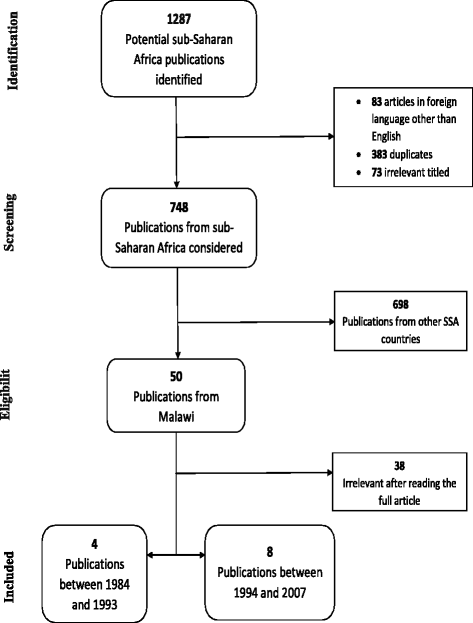Malaria research and its influence on anti-malarial drug policy in Malawi: a case study
- PMID: 27246503
- PMCID: PMC4888534
- DOI: 10.1186/s12961-016-0108-1
Malaria research and its influence on anti-malarial drug policy in Malawi: a case study
Abstract
Background: In 1993, Malawi changed its first-line anti-malarial treatment for uncomplicated malaria from chloroquine to sulfadoxine-pyrimethamine (SP), and in 2007, it changed from SP to lumefantrine-artemether. The change in 1993 raised concerns about whether it had occurred timely and whether it had potentially led to early development of Plasmodium falciparum resistance to SP. This case study examined evidence from Malawi in order to assess if the policy changes were justifiable and supported by evidence.
Methods: A systematic review of documents and published evidence between 1984 and 1993, when chloroquine was the first-line drug, and 1994 and 2007, when SP was the first-line drug, was conducted herein. The review was accompanied with key informant interviews.
Results: A total of 1287 publications related to malaria drug policy changes in sub-Saharan Africa were identified. Using the inclusion criteria, four articles from 1984 to 1993 and eight articles from 1994 to 2007 were reviewed. Between 1984 and 1993, three studies reported on chloroquine poor efficacy prompting policy change according to WHO's recommendation. From 1994 to 2007, four studies conducted in the early years of policy change reported a high SP efficacy of above 80%, retaining it as a first-line drug. Unpublished sentinel site studies between 2005 and 2007 showed a reduced efficacy of SP, influencing policy change to lumefantrine-artemether. The views of key informants indicate that the switch from chloroquine to SP was justified based on local evidence despite unavailability of WHO's policy recommendations, while the switch to lumefantrine-artemether was uncomplicated as the country was following the recommendations from WHO.
Conclusion: Ample evidence from Malawi influenced and justified the policy changes. Therefore, locally generated evidence is vital for decision making during policy change.
Keywords: Anti-malarial drug policy; Chloroquine; Lumefantrine-artemether; Malaria; Malawi; Sulfadoxine-pyrimethamine.
Figures
References
-
- World Health Organization . Evidence Review Group meeting on Intermittent Preventive Treatment of malaria in pregnancy (IPTp) with Sulfadoxine-Pyrimethamine (SP) Geneva: WHO; 2012.
-
- Durrheim DN, Williams HA, Barnes K, Speare R, Sharp BL. Beyond evidence: a retrospective study of factors influencing a malaria treatment policy change in two South African provinces. Critical Public Health. 2003;13(4):309–30. doi: 10.1080/09581590310001615862. - DOI
MeSH terms
Substances
LinkOut - more resources
Full Text Sources
Other Literature Sources
Medical


